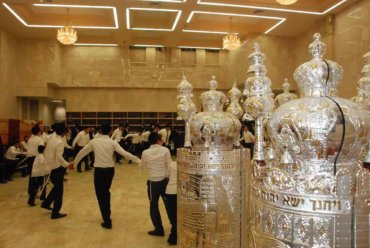
Is There A Blessing To Recite When A Hostage Is Rescued?
Dear Jew in the City,
Is there a blessing to recite when a hostage is rescued?
Thank you,
Eliana
–
Dear Eliana,
Thanks for your question. Brachos (blessings) are recited on a number of special occasions. We recite brachos on natural phenomena like thunder and lightning, and upon seeing a rainbow. We recite brachos on seeing a world-class Torah scholar, an Einstein-level secular genius, or a king who has absolute power over his subjects. And yes, we recite brachos on good and bad events. If an event is good for me, I would recite the bracha of shehechiyanu, that God has kept us alive to see this event. If something is good for me and other people, I would recite the bracha of hatov v’hameitiv, that God is good and He does good. If something is bad for me, God forbid, I would recite the bracha of Dayan ha’emes, that God is the true Judge.
But that’s only if something affects me personally. When I lost close family members, I recited the bracha of Dayan ha’emes in full, i.e., “Blessed are You, Hashem our God, King of the universe, the true Judge.” If I hear that a friend lost a parent (God forbid), I wouldn’t recite the whole bracha of Dayan ha’emes. Rather, I would simply recite the phrase “Baruch Dayan ha’emes,” “Blessed is the true Judge.” I don’t recite the full bracha because, sad as it may be, it’s not my loss, so it’s not my bracha to recite.
Similarly, the captives might recite a bracha upon being released. Their immediate families might also do so. But happy as we might be, it’s not our bracha to recite. Rather, you might simply exclaim, “Baruch hatov v’hameitiv!” – “Blessed is the One Who is good and Who does good!”
Sincerely,
Rabbi Jack Abramowitz
–
Dear Rabbi Jack,
But what about the bracha of matir asurim?
Sincerely,
Eliana
–
When you asked the first question, I knew that we were going to end up here! Despite what you might think from the text, the bracha of matir asurim – that Hashem frees the captive – is not literally a bracha on captives being freed. Yes, that is something that Hashem does, as we acknowledge in every recitation of the Shemoneh Esrei, but it’s not the intention of the bracha of matir asurim as recited in the morning blessings.
The gemara in tractate Brachos (60b) explains when these brachos were originally recited. (I won’t go through all of them because there are quite a few.) In part, it says:
When one opens his eyes, he recites the blessing that God gives sight to the blind. When one sits up, he recites the blessing that God frees the captive. When one gets dressed, he recites the blessing that God clothes the naked. When one stands up, he recites the blessing that God straightens the bent….
There are more, but the one we want is close to the front: When one sits up, he recites the blessing that God frees the captive. It’s pretty clear from context, but the Kitzur Shulchan Aruch (7:3) is explicit that the intention of this blessing is not to thank God for releasing any actual captives, but to thank Him for giving our bodies freedom of movement.
Since you appear to be dissatisfied with my initial reply and would like more ways to praise and thank God for His goodness, let me suggest reciting Psalms of praise. I have two precedents for this.
At the risk of revealing my advanced age, I’ll share a story. When I was in high school, I went to participate in Rav Moshe Feinstein’s minyan. I came bearing several questions from myself and others. One was about reciting Hallel on a certain occasion, which we won’t get into here.
The answer given was that if the Sages didn’t institute Hallel for an occasion, then reciting it during davening would constitute an interruption in the prayer service. However, if one feels an occasion warrants extra praise, he can always recite the Psalms that make up Hallel (Psalms 113-118), without a bracha, after davening.
Specifically addressing captives being freed, I have it on good authority that following the famous 1976 “raid on Entebee,” the Breuer’s Jewish community in Washington Heights acknowledged the occasion with a responsive recitation of Mizmor L’Sodah (“A Song of Thanks,” i.e., Psalm 100, a standard part of the daily prayer service).
Wanting to praise Hashem is a great thing, and highly encouraged, but the way to go about it is not by reciting brachos out of context. If a simple “Baruch hatov v’hameitiv!” feels insufficient, follow the example of King David and sing out with the appropriate Psalms of praise.
Sincerely,
Rabbi Jack Abramowitz
Educational Correspondent
Follow Ask Rabbi Jack on YouTube
If you found this content meaningful and want to help further our mission through our Keter, Makom, and Tikun branches, please consider becoming a Change Maker today.









